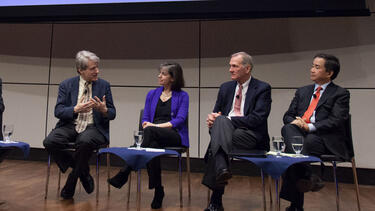Can Finance Do Good?
The concluding discussion of the three-day Business + Society conference was titled “Finance in Society,” and dealt with both the tension and the possibility in that relationship.

The four participants were distinguished scholars—Nobel laureate Robert Shiller and China finance expert Zhiwu Chen—and influential practitioners—Yale investment head and creator of the “Yale method” David Swensen and Harvard endowment chief Jane Mendillo. The discussion was moderated by Professor William Goetzmann.
There were points of agreement among all the panelists: Of course, finance is essential to furthering the development of society. It’s the circulatory system of the economy, said Mendillo, drawing on an analogy used in an earlier panel. Financial development parallels the rise of individual liberty, argued Zhiwu Chen. The finance system can fuel innovation, said Shiller. But all of the panelists acknowledged the destructive power of finance run amok, with Swensen taking the strongest stand, saying that incentives on Wall Street were furthering the income inequality that is tearing at society.
One question in particular drew out the differences in the panelists’ views. The question was, to paraphrase: Given the tendency of the financial system to concentrate wealth, is there also a financial mechanism that can help re-balance society? Or, to simplify further, can finance do good?
The question fell squarely into Shiller’s wheelhouse, and he had a list of financial innovations ready. These ideas flowed from his conviction that “finance is about risk management and risk management tends to lower inequality… We need to democratize finance.” He mentioned making good financial advice affordable for low-income people, creating home equity insurance, or structuring mortgages with pre-planned workouts in case a borrower loses a job. Then he laid out his most audacious idea, which he admitted might have to wait for “a future that is a little more enlightened than we are now.” He suggested passing a law that would establish a formula by which, if inequality goes up in the future, then taxes on the wealthy would automatically go up as well. The idea may be politically unpalatable and require a level of international coordination that would be a heavy lift to say the least, but Shiller insisted it was important to start acting today. “I think there is a risk that we will have rich areas of the world and we’ll have rich communities in the world and abject poverty elsewhere. That’s a future that I don’t want to see.”
Swensen, on the other hand, focused on restraining excesses in the financial system. He recommended, first, taking risk out of the system by increasing capital requirements, then increasing transparency. “One specific example would be in the area of derivatives and swaps. Wall Street has fought enormously against putting derivatives and swaps on exchanges, because the profit goes away when you’ve got that kind of transparency.” But, he argued, this transparency would prevent one firm from becoming a risk to the whole system by accumulating huge, unbalanced positions, as AIG did in the financial crisis. His third point: “We need more accountability. When people commit criminal acts, they should go to jail. The corporation shouldn’t pay a fine on their behalf.” He also advocated for brokers to have a stronger fiduciary responsibility. “There are lots of ways we can make the system less risky, make the participants more accountable, and make the system more transparent that would move toward having less of this extraordinary income gap that’s driven by Wall Street and commercial banking compensation.”
The call for tighter regulation might have been bait for Zhiwu Chen. In his view, increased regulation could have the unintended consequence of exacerbating inequality. He argued that the financial services industry has more in common with internet firms than with companies in traditional industries like agriculture or food service in terms of the production function of labor. In many cases, he explained, it takes no more labor to put together a $1 million deal than a $10 billion deal. This dynamic contributes to the fact that financial services accounts for 4% of total employment in the U.S. but consumes more than 30% of total profits, with obvious implications for inequality. However, there may not be a simple remedy. “If you have more and tighter regulations to restrict entry to financial services, that will only create less competition so the rent for everyone who can get into this business will go higher.”
Mendillo agreed with both Chen’s hesitance to institute new regulations and the impetus to make some sort of change expressed by Shiller and Swensen. How to square that circle? “There’s no top-down solution. I really think it bears pointing out that it comes down to individuals and institutions and the individuals who lead those institutions,” said Mendillo. This brought her to the role that education can play in training the future leaders of financial institutions. She suggested that a good financial education should include a solid grounding in the fundamentals, a historical understanding of what financial innovation has done, for good and bad, and a serious consideration of ethics. “When you’re involved in finance, you’re managing other people’s money, you’re advising them about their money, you’re providing for the future of an institution or a company or a set of companies.… That creates another level of responsibility.” Education can produce more leaders who take that responsibility seriously.